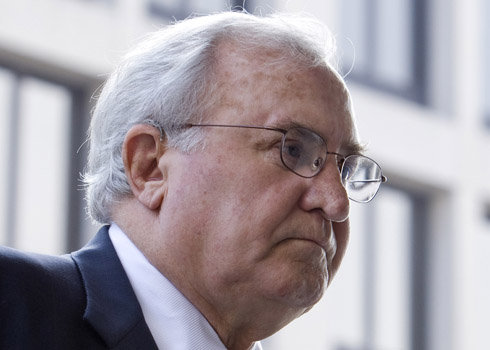Hat tip Alaska Dispatch…
Did U.S. prosecutors pressure police to end a child-sex-crimes investigation in order not to endanger the federal probe of corruption in Alaska politics, then withhold evidence about the episode? That’s what court documents filed on behalf of a former state lawmaker convicted in the investigation are charging.
Those same documents also claim that an embarrassing “physical characteristic” that “most men would seek to shield from public knowledge,” may have helped lead to the latest potential prosecutorial missteps to surface in the investigation.
Last month, an attorney representing Pete Kott filed a motion to dismiss the charges against the former GOP legislator, who was convicted in 2007 of using his influence to benefit oil-services contractor Bill Allen, in exchange for money and other favors. The filing alleged, based on new documents that the government was recently ordered by a court to hand over, that federal prosecutors had previously withheld from the defense several pieces of information that undermined Allen’s credibility as the government’s key witness.
According to the motion, the government was aware of a probe by the Anchorage Police Department of credible allegations that Allen had sex with several underage girls. It also knew that an Anchorage police officer had testified in 2004 that he was told by a federal prosecutor to stop investigating the child-sex case because it might undermine a federal investigation which Allen was involved in. But, according to the motion, prosecutors never told the defense about the officer’s testimony. Indeed, the Feds had previously explicitly argued that the child-sex allegations against Allen were irrelevant to the case against Kott — an argument contradicted by the police officer’s testimony about what he was told.
The defense argues that knowing the full extent of Allen’s legal exposure undermines his credibility as a witness, because it may have made him more willing to cooperate with prosecutors in exchange for going easy on him. And, the motion argues, that would have been especially true because had Allen been charged with child-sex crimes, “a physical characteristic of Bill Allen that would be considered extremely embarrassing, and that most men would seek to shield from public knowledge,” might have been made public by one of his alleged victims.
Here’s the key excerpt from the filing:
At trial, the government briefly – and obliquely – referred to a “_____ _____ [CHILD VICTIM 1]”9 issue. The government raised this at a hearing that was closed to the public, at the government’s request, and held in a closed courtroom on September 13, 2007, at 9:52 a.m. At the end of that hour-long hearing, the government for the first time raised the name of CHILD VICTIM 1, which obviously came as a surprise to the defense. It raised CHILD VICTIM 1’s name in one sentence, raised no other young women’s names, and concluded that same sentence with, “the Government would posit that has no relevance whatsoever to this case.”
…
The government, however, was fully aware that such evidence existed and must
have know of its importance in two different areas: it showed prior acts of criminality,
and it showed Bill Allen’s desperate attempts to convince his victims to lie to protect
him. Its newly released documents contain allegations and evidence that Bill Allen
committed a multitude of primarily sex crimes against children, and that he sought to
have them swear that he never committed such acts.Those documents begin with descriptions of Mann Act violations by Bill Allen
with CHILD VICTIM 2 in 2000. APD 1-17. They contain an interview with that
woman, who was a child of 16 in the year 2000, in which she states that at that time,
Allen he flew her up from Seattle to Anchorage, apparently for sex. APD 9. She
continues that there were gifts waiting for her in the hotel room when she arrived. When
asked about any distinguishing physical features of Bill Allen, so that they could confirm
her descriptions, the woman gave specific and detailed information about a physical
characteristic of Bill Allen that would be considered extremely embarrassing, and that
most men would seek to shield from public knowledge. APD 11. She continued, during
this police interview, with graphic description of their typical sex sessions when she was
a minor.…
Then, critically, we have a document typed by Anchorage Police Department Det.
Vandergriff, about this VICTIM 5, dated November 4, 2004. APD 47. It memorializes
the advisement that he was given, in his words, in “March 2004.” Id. That advisement
was: “In March 2004 I was advised by AUSA Frank Russo to not actively investigate
this case as it might interfere with a federal investigation involving Allen and Josef
Boehm.” Id. Thus, according to this document, the U.S. government stopped the APD
investigation of Bill Allen in March 2004 “as it might interfere” with an investigation
“involving Allen.” This certainly stands in sharp contrast to government assurances in
the sealed hearing that the two investigations had absolutely nothing to do with each
other.
Allen was also the key witness in the government’s case against Ted Stevens, which was dismissed after similar examples came to light of prosecutors withholding evidence from the defense. Allen was sentenced today to three year in prison for his central role in the corruption scheme.
“The failure to disclose the extent of their key witness’s exposure lies on them,” Kott’s lawyer, Sheryl Gordon McCloud, told TPMmuckraker. “The trial revolves around the key issue of credibility,” she added, arguing that the new information badly damages Allen’s.
As for the evidence that the Feds pressured local police to drop the child-sex probe, that may have been the kind of understandable trade-off that law enforcement routinely makes in pursuing overlapping cases. But if nothing else, the government’s apparent concern that the sex probe could have damaged the credibility of its key witness would appear to raise yet more questions about the entire Alaska corruption investigation.






